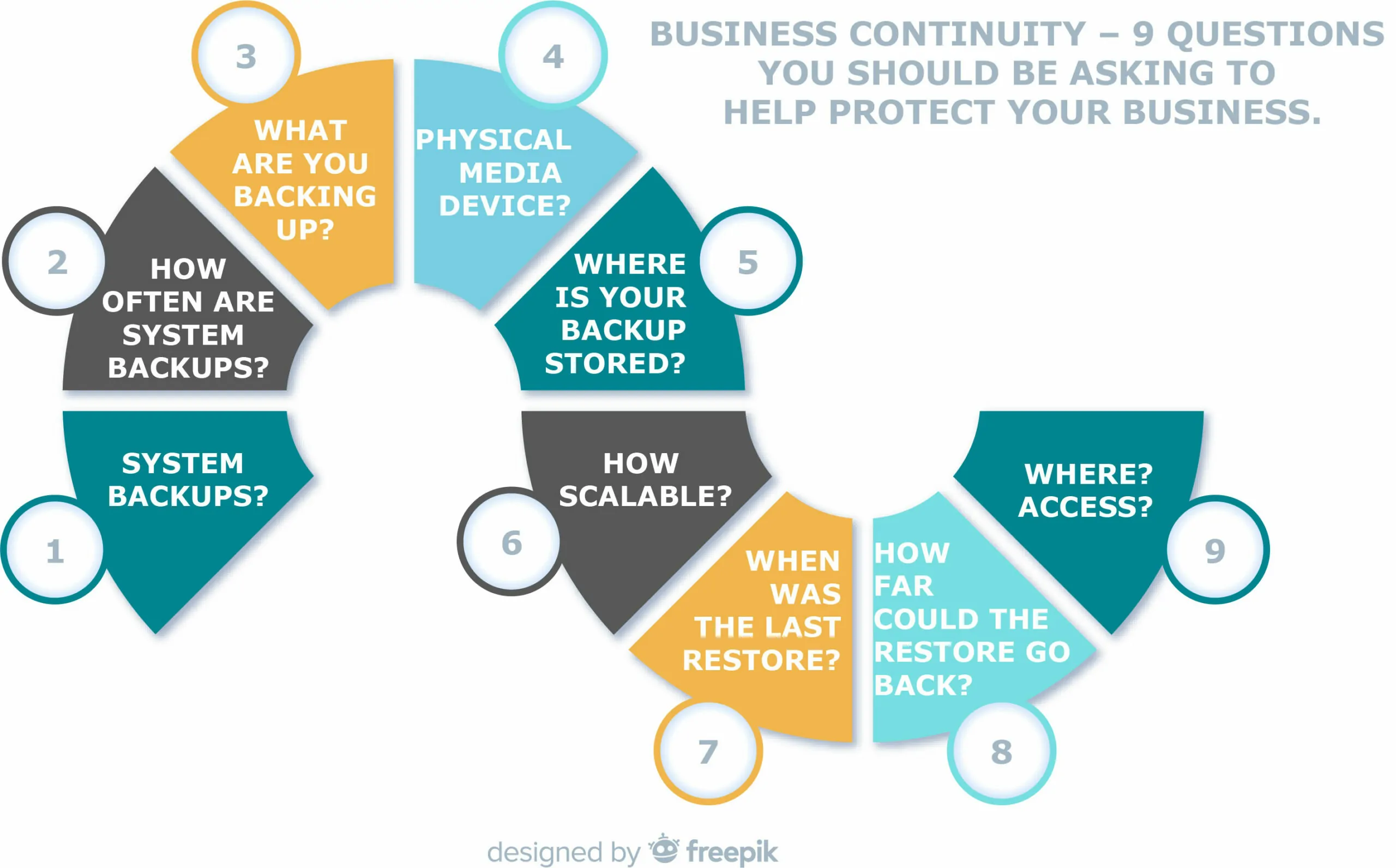Business Continuity – 9 questions you should be asking to help protect your business
We published our “Spring” Customer newsletter last week and overwhelmingly and not surprisingly, the subject that was raising the most questions was Business Continuity and how our technology could help.
In this brief blog, we ask the questions that we hope will help you protect your business now and in the future.
System Backups
Essential in a Disaster Recovery scenario.
- Who is carrying out system backups and what happens when they are not there?
As is often the case the human element of a process is the weakest link. As far as possible we’d recommend you automate the backup process.
- How often are your backups happening?
The more frequent the backup, the less impact an outage is likely to have. The time a backup will take can also impact frequency. Regular backups using incremental and deduplication technology are the best option and moving these to the cloud is recommended as the cost is coming down significantly for cloud-based storage.
- What are you backing up – Applications, Databases, Email, and Servers?
Double-check what is being backed up. Ideally, ask your third party or IT Department to review the backup process and confirm any areas of risk. Alternatively, an independent review could also be worth investigating to look at other areas of the business that may be at risk.
- Is your back-up onto a physical media device?
The quality of the backup is only as good as the media being used to hold your business-critical data. Devices should be checked regularly and so should data that is being backed up! If using physical media the media should also be encrypted as well just in case this falls into the wrong hands.
- How scalable is your backup solution?
Large databases can take longer to backup and restore. These days data volumes mean this can be labour-intensive, time-consuming and costly. Utilizing advances in backup technologies can improve your time to recover and restore.
- Where is your backup stored?
Business-critical data should be stored in a secure location, off-site but you need to ensure that this is easily accessible.
- When did you last carry out a TEST restore?
Often the first time a restore is carried out is when you need to recover vital data. Obviously, that’s too late. It always considered best practice to come up with a testing schedule around restoring different elements of your data restores. If you use a Managed Service Provider talk to them and find out how they can help. If you have an IT department, ask them for a copy of the backup restore testing schedule and if they don’t have one, implement one!
- If you needed to restore, how far back could you go?
Wouldn’t it be great to selectively restore from last night, last week or even last year? It is also worth ensuring that your backup retention policy falls in line with any legal requirements you have around the data that your business holds.
Business Continuity
The obvious subsequent question though is
- Where would you restore too, and could your staff access the restored system?
This is when an internet-based backup solution comes into its own. Not only can you backup to the cloud, as often as you like to the Microsoft Cloud, but you can replicate your servers into an environment created for you that can be accessed securely using standard Microsoft Cloud Technology.

One thing is for sure, at a time when Ransomware and Phishing attacks are on the increase and, as we are experiencing currently, a virus has changed our working practice and economy beyond all recognition, more than ever a secure and robust data backup and business continuity strategy is critical.
Check out our white paper on Disaster Recovery and Business Continuity at https://m-hance.com/resources/protect-your-business-with-business-continuity-disaster-recovery-planning-ebook/
m-hance – a Trusted Service Provider
As a Microsoft Tier One Cloud Solution Provider, m-hance has all the appropriate credentials and is recognised as one of the top Azure Cloud Providers in the U.K.
Having worked with many of our Clients for years either on Financial or CRM software, m-hance is familiar with the concept of data security, resilience, and confidentiality; for many of our clients, we are a Trusted Partner.
If you are considering making the move from on-premise to Azure, make sure that when you select your Managed Service Partner you are also selecting a Trusted Service Partner.
m-hance – We’re with you all the way.
